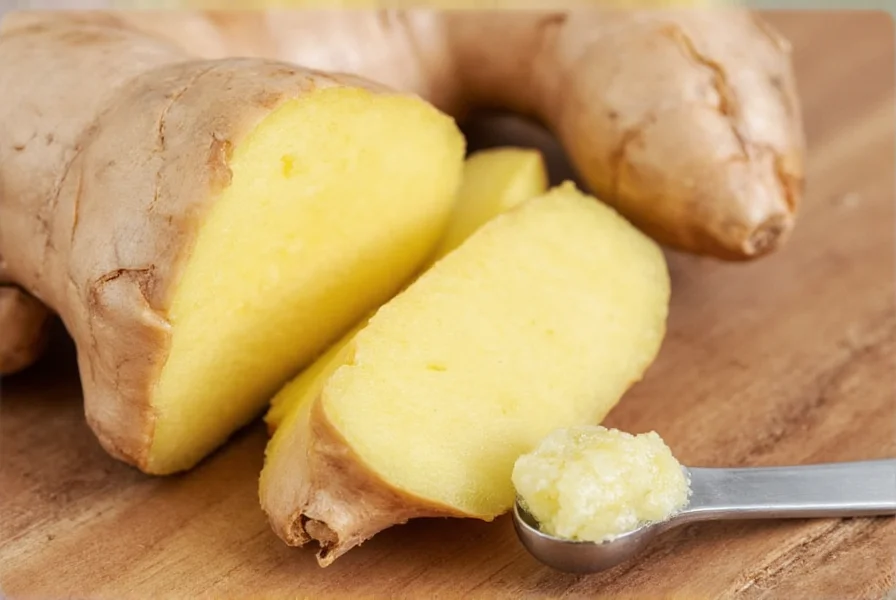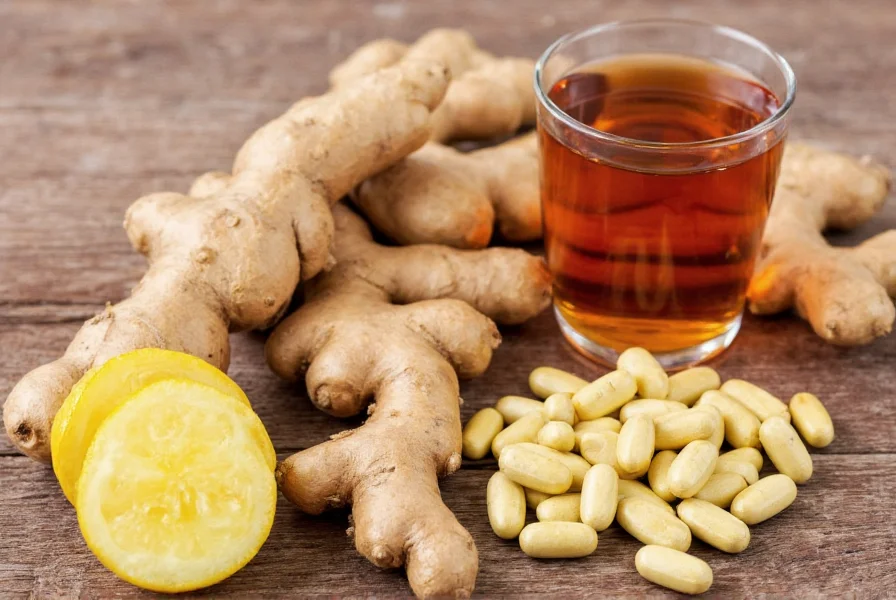Ginger root has gained attention as a potential natural remedy for acid reflux, a condition affecting millions worldwide. While conventional medications like proton pump inhibitors remain standard treatment, many seek gentler alternatives with fewer side effects. This comprehensive guide examines what current research says about ginger's effectiveness for acid reflux, proper usage methods, and important safety considerations.
The Science Behind Ginger and Acid Reflux
Ginger (Zingiber officinale) contains bioactive compounds called gingerols and shogaols that influence digestive processes. These compounds appear to work through several mechanisms relevant to acid reflux:
- Accelerated gastric emptying - A study published in the European Journal of Gastroenterology & Hepatology found ginger increased antral contractions by 63% and sped gastric emptying by 25%
- Anti-inflammatory effects - Gingerols inhibit inflammatory pathways that can exacerbate esophageal irritation
- Antioxidant properties - Helps protect esophageal tissue from damage caused by stomach acid
- Modulation of lower esophageal sphincter function - May help maintain proper sphincter pressure
Unlike many conventional acid reflux medications that suppress acid production, ginger appears to work by improving overall digestive function. This makes it potentially valuable for individuals with functional dyspepsia or delayed gastric emptying contributing to their reflux symptoms.

Research Evidence on Ginger for Acid Reflux
The scientific evidence supporting ginger for acid reflux comes primarily from small studies and traditional use:
| Study | Participants | Findings | Limitations |
|---|---|---|---|
| 2007 Molecular Research and Food Nutrition | In vitro and animal models | Gingerols inhibited gastric contractions by 57% | No human subjects |
| 2011 Journal of Alternative and Complementary Medicine | 79 participants with dyspepsia | 2x faster gastric emptying with ginger | Not specifically acid reflux patients |
| 2019 Integrative Medicine Insights | Systematic review | Positive but limited evidence for digestive benefits | Called for larger clinical trials |
While promising, researchers consistently note the need for larger, more rigorous clinical trials specifically examining ginger's effects on gastroesophageal reflux disease (GERD). Most existing studies focus on ginger's broader digestive benefits rather than acid reflux specifically.
How to Use Ginger for Acid Reflux Symptoms
For those interested in trying ginger for acid reflux relief, proper preparation and dosage are crucial. The form and timing of ginger consumption significantly impact its effectiveness:
Recommended Forms and Dosages
- Fresh ginger tea - 1-2 inches of fresh ginger root sliced and steeped in hot water for 10 minutes, consumed 20-30 minutes before meals
- Ginger capsules - 500-1500 mg standardized extract taken before meals (look for products containing 5% gingerols)
- Ginger chews - Small pieces (about 1/4 inch) chewed slowly after meals
- Ginger powder - 1/4-1/2 teaspoon mixed with warm water before meals
Most studies showing digestive benefits used doses equivalent to 1-1.5 grams of fresh ginger. It's generally recommended to start with lower doses and gradually increase to assess tolerance. For acid reflux specifically, consuming ginger before meals appears more effective than after eating.

Potential Benefits Beyond Acid Reflux Relief
Ginger offers several additional digestive benefits that may complement its potential effects on acid reflux:
- Nausea reduction - Particularly helpful for those experiencing reflux-related nausea
- Improved nutrient absorption - Better digestion may reduce fermentation that produces gas and pressure
- Anti-spasmodic effects - May reduce esophageal spasms that mimic or worsen reflux symptoms
- Reduced bloating - By promoting more efficient digestion
Safety Considerations and Potential Side Effects
While generally considered safe, ginger may not be appropriate for everyone with acid reflux:
- Paradoxical worsening - Some individuals report ginger actually triggers or worsens their reflux symptoms, possibly due to its mild irritant properties
- Medication interactions - Ginger may interact with blood thinners, diabetes medications, and certain heart medications
- Pregnancy considerations - While often used for morning sickness, high doses during pregnancy should be discussed with a healthcare provider
- Dosage limits - Most experts recommend not exceeding 4 grams of ginger daily from all sources
Individuals with gallstones should consult a physician before using ginger regularly, as it may increase bile production. Those with bleeding disorders or scheduled for surgery should avoid high-dose ginger due to potential blood-thinning effects.
Ginger Compared to Other Acid Reflux Remedies
How does ginger stack up against other common acid reflux approaches?
- vs. Antacids - Ginger works preventatively by improving digestion rather than neutralizing existing acid
- vs. H2 blockers - Ginger addresses underlying digestive function rather than suppressing acid production
- vs. Other natural remedies - Unlike baking soda (which neutralizes acid but creates gas), ginger works with the body's natural processes
- vs. Dietary changes - Ginger can complement dietary modifications but shouldn't replace necessary lifestyle changes
The most effective approach often combines ginger with other evidence-based strategies like elevating the head during sleep, avoiding trigger foods, and maintaining a healthy weight.
When Ginger Might Not Be Right for You
Despite its potential benefits, ginger may not be suitable in certain situations:
- If you experience burning sensations after consuming ginger
- When taking blood-thinning medications like warfarin
- If you have a history of ginger allergy (rare but possible)
- During the first trimester of pregnancy at high doses
- If you have active peptic ulcers
Discontinue use immediately if you notice worsening symptoms. Chronic acid reflux requires medical evaluation to rule out serious conditions like Barrett's esophagus or esophageal strictures.
Practical Tips for Incorporating Ginger
For those wanting to try ginger for acid reflux relief, these practical suggestions can help maximize benefits while minimizing potential issues:
- Start with small doses (1/4 teaspoon of grated ginger or 250mg capsule) to assess tolerance
- Consume ginger 20-30 minutes before meals rather than after eating
- Choose fresh ginger over processed products which may contain additives
- Peel ginger root thoroughly as the skin contains higher concentrations of potentially irritating compounds
- Combine with soothing ingredients like fennel or chamomile if initial use causes discomfort
- Keep a symptom journal to track effects over 2-4 weeks
When to Consult a Healthcare Professional
While ginger may provide relief for mild, occasional acid reflux, certain symptoms warrant medical attention:
- Persistent heartburn occurring more than twice weekly
- Difficulty swallowing or painful swallowing
- Unintentional weight loss
- Vomiting blood or coffee-ground-like material
- Black, tarry stools
- Symptoms that disrupt sleep regularly
Chronic acid reflux can lead to serious complications including esophagitis, strictures, and Barrett's esophagus. A healthcare provider can determine if your symptoms require prescription treatment or further investigation through endoscopy.
Conclusion
Ginger root shows promise as a complementary approach for managing mild acid reflux symptoms through its effects on gastric motility and inflammation. While not a replacement for medical treatment in moderate to severe cases, it may provide relief for some individuals when used appropriately. The key is understanding that natural remedies like ginger work differently than conventional medications and require proper timing and dosage. As with any treatment approach, individual responses vary, so careful self-monitoring is essential. Always consult with a healthcare provider before starting any new treatment regimen, especially if you have underlying health conditions or take medications.
Frequently Asked Questions
Can ginger root make acid reflux worse for some people?
Yes, while many find ginger helpful for acid reflux, some individuals report it worsens their symptoms. Ginger contains compounds that can mildly irritate the digestive tract, potentially increasing acid production in sensitive individuals. If you experience burning sensations or increased reflux after consuming ginger, discontinue use. Those with severe GERD or esophagitis may be more likely to experience negative effects.
How long does it take for ginger to work for acid reflux?
Ginger's effects on digestion typically begin within 20-30 minutes of consumption, which is why taking it before meals is recommended. However, for noticeable improvement in chronic acid reflux symptoms, consistent use over 2-4 weeks may be necessary. Some people report immediate relief from occasional reflux episodes, while others notice gradual improvement in overall digestive function with regular use.
What's the best time to take ginger for acid reflux relief?
For optimal results with ginger and acid reflux, consume it 20-30 minutes before meals to prepare your digestive system. This timing allows ginger to stimulate gastric motility before food arrives, potentially preventing the delayed emptying that contributes to reflux. Some people also find benefit from a small amount after meals, but taking it before eating generally produces better results for preventing reflux episodes.
Is fresh ginger more effective than ginger supplements for acid reflux?
Both fresh ginger and standardized supplements can be effective, but they work differently. Fresh ginger contains a broader spectrum of compounds that work synergistically, while supplements provide consistent dosing of specific active compounds like gingerols. For acid reflux specifically, fresh ginger tea may be preferable as the warmth can be soothing, but supplements offer precise dosing. Look for supplements standardized to contain 5% gingerols for digestive benefits.
Can I use ginger root alongside my prescription acid reflux medication?
In most cases, ginger can be safely used alongside prescription acid reflux medications like PPIs or H2 blockers, but consult your healthcare provider first. Ginger works through different mechanisms than these medications, potentially providing complementary benefits. However, if you're taking blood thinners or certain diabetes medications, ginger may interact with these drugs. Never discontinue prescribed medications without consulting your doctor, even if using natural remedies like ginger.











 浙公网安备
33010002000092号
浙公网安备
33010002000092号 浙B2-20120091-4
浙B2-20120091-4